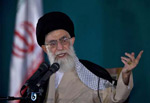 Wall Street Journal: Iranian officials have delivered conflicting responses to U.S. allegations that Tehran plotted to assassinate Saudi Arabia’s ambassador in Washington, in a new sign of a split among Iran’s decision makers.
Wall Street Journal: Iranian officials have delivered conflicting responses to U.S. allegations that Tehran plotted to assassinate Saudi Arabia’s ambassador in Washington, in a new sign of a split among Iran’s decision makers.
The Wall Street Journal
By FARNAZ FASSIHI
 Iranian officials have delivered conflicting responses to U.S. allegations that Tehran plotted to assassinate Saudi Arabia’s ambassador in Washington, in a new sign of a split among Iran’s decision makers.
Iranian officials have delivered conflicting responses to U.S. allegations that Tehran plotted to assassinate Saudi Arabia’s ambassador in Washington, in a new sign of a split among Iran’s decision makers.
Washington has said all options are on the table to retaliate for the alleged plot, including military action and tougher sanctions on Iran’s Central Bank—the only remaining conduit for the oil revenue that is the backbone of the Iranian regime’s finances.
On Monday, a dual U.S.-Iranian citizen, Manssor Arbabsiar, pleaded not guilty in a U.S. District Court in Manhattan to criminal charges of hiring a U.S. undercover agent posing as a member of a Mexican drug cartel to murder the Saudi ambassador.
While senior Iranian officials have defiantly denied and ridiculed the U.S. allegations, Iranian diplomats have offered to help investigate, in a sign of concern that the fallout from the alleged plot could be worse for Tehran than longstanding accusations over its nuclear program.
How Iran weathers the allegations will depend in part on whether the faction advocating a confrontational tone wins over those supporting diplomacy.
Iran’s conservatives, who now control the government, are divided between loyalists of Supreme Leader Ayatollah Ali Khamenei and supporters of President Mahmoud Ahmadinejad who favor less clerical control.
In the past, Iranian political factions have been able to unify against outside pressure, whereas internal cracks now make it difficult to present a consolidated front.
The first sign that Iran was struggling to devise an effective strategy to limit the damage from the accusation by U.S. officials on Oct. 11 came in the slow response by top officials.
It took six days for Iran’s top two officials to comment on the alleged plot, an unusual lapse.
When they did respond, the two leaders ridiculed the charges with traditional revolutionary bombast.
Mr. Khamenei warned that Iran would respond harshly to any “illicit” actions by the U.S. Mr. Ahmadinejad, giggling and shrugging in an interview with al-Jazeera, refused any cooperation with U.S. investigators.
State-influenced Iranian news sources then followed the defensive effort by publishing accusations that the plot was cooked up by an opposition group.
But supporters of Mr. Ahmadinejad soon showed a more conciliatory tone. Foreign Minister Ali Akbar Salehi said Iran was prepared to carefully examine the U.S.’s evidence and would conduct a “serious and patient” investigation, even if the charges were fabricated.
The statement by Mr. Salehi, an Ahmadinejad ally, reflected a leaning by the president to show some willingness to negotiate—at odds with Mr. Khamenei.
Iran’s judiciary chief, Ayatollah Sadeq Larijani, a critic of Mr. Ahmadinejad, said last week that he was appointing a special envoy to investigate alleged crimes against Muslims by the U.S.
This rupture is on display almost on a daily basis, in domestic and foreign policy. The conservative-dominated parliament voted on Sunday to impeach the finance minister, a close ally of Mr. Ahmadinejad, over a $2.6 billion bank fraud that has roiled Iranian politics. The president has denied any wrongdoing by himself or his administration.
That split has also been seen with regard to international pressure over Iran’s nuclear program. Mr. Ahmadinejad offered publicly, while in New York for the United Nations General Assembly in September, to start talks with the U.S.
Mr. Khamenei immediately shot down the idea, according to Iranian news reports.
The contradiction in responses stems from disagreements over how to deal with the West, analysts said.
Now, the prospect that the U.S. could pursue sanctions at the U.N. Security Council against Iran’s central bank is a particular concern, though China and Russia have opposed such action.
“Iran’s response [to the plot allegations] shows that they are very worried,” said Hossein Bastani, a political analyst based in France who worked for the administration of President Mohammad Khatami. “Many officials are secretly wondering, ‘What if this true?’ And even if it isn’t, the damage is already done.”
—Chad Bray contributed to this article.


